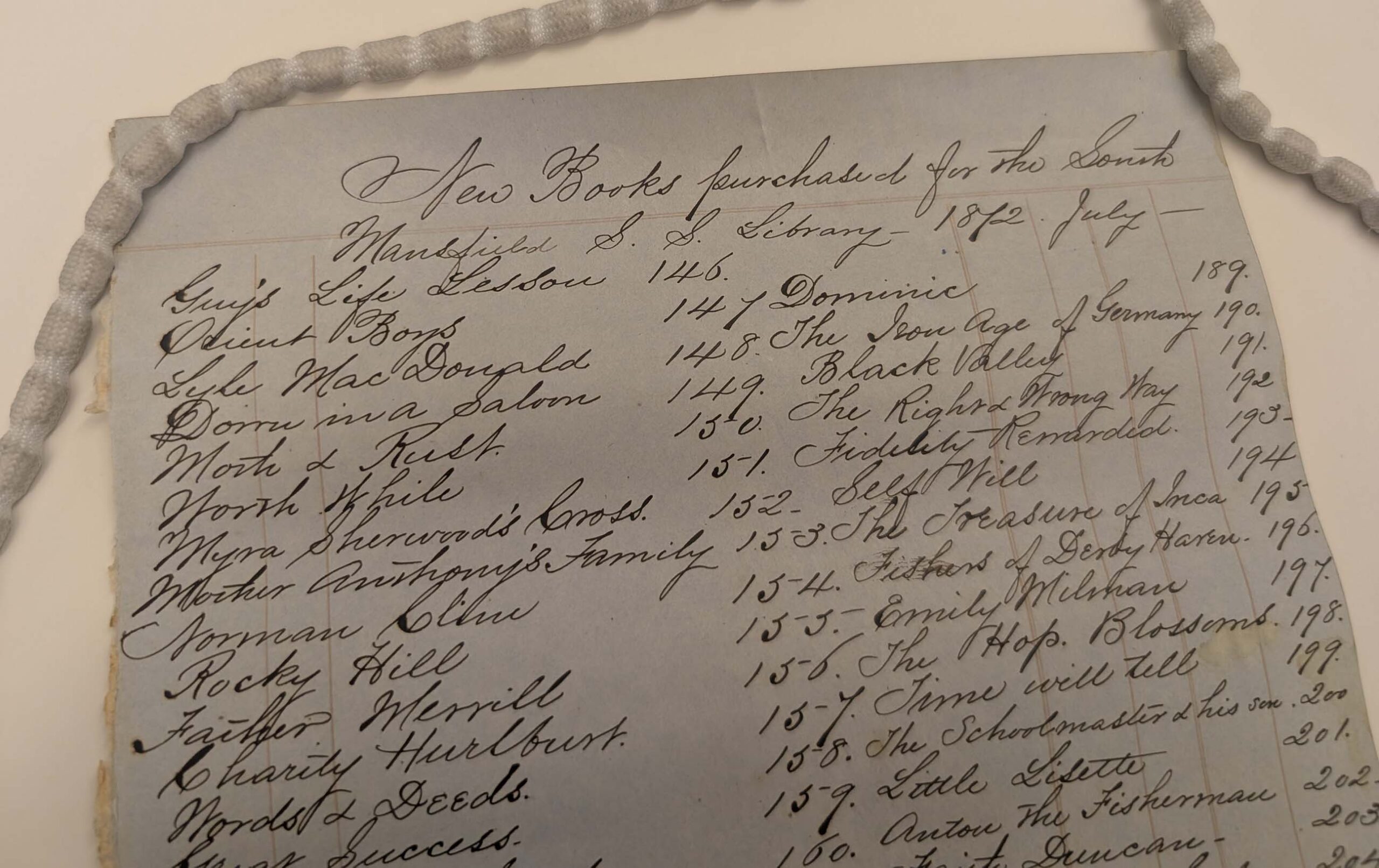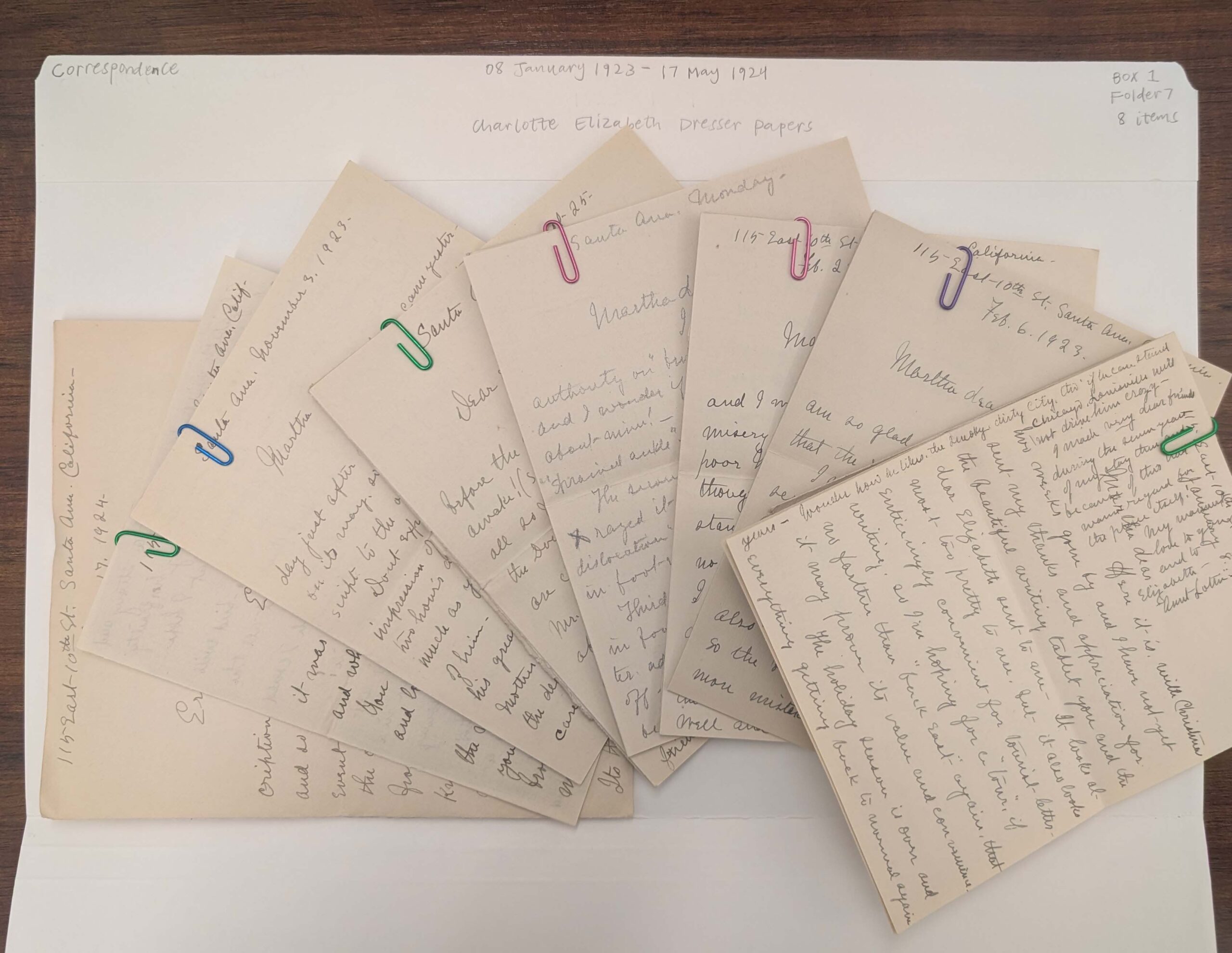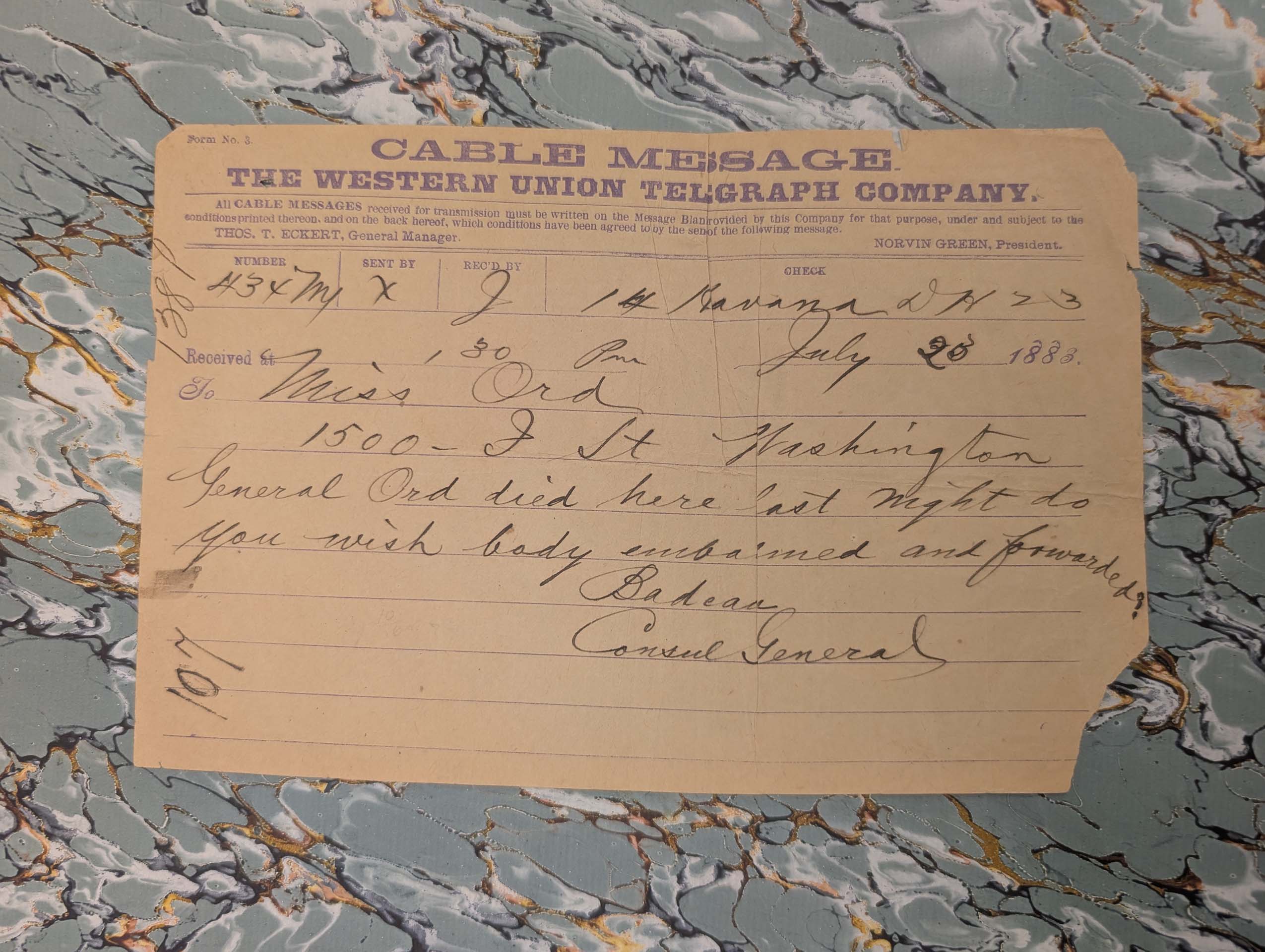From the diary of a member of the Midland Baseball Club of Oxford to the papers of British Consul-General James Colquhoun, the Manuscripts Department has made a wide variety of collections available for research this month. Read on to learn about these twenty-five newly processed manuscript collections!
William A. Bailey and John K. Somers account book, 1875
This slim account book compiled by William A. Bailey and John K. Somers in 1875 (possibly in Bristol, New Hampshire) consists of entries relating to a dry goods store and possibly a bank or lender. The store sold slippers, boots, rubbers, chamber sets, parlor suits, shawls, and other merchandise. The volume also includes documentation of assets, liabilities, real estate, stocks, insurance, and more (for example, “Concord Railroad Stock,” page 13).
Obed P. Baker of South Dennis, Massachusetts, kept 28 pages of daybook entries to record his customers’ accounts during June and July of 1857. He sold fabrics, clothing, food, household goods, and other items. Baker wrote the accounts in blank pages at the end of Charles Northend’s The Common School Book-Keeping, printed by Brown, Taggard & Chase (Boston) in 1856.
Chaffee family account book, 1807-1849
This account book, probably kept by a physician in Wilbraham, Massachusetts, contains entries relating to medical and physical care, and others relating to clothing, foodstuffs, fabric, and services rendered. The entries were dated between 1807 and 1849 (bulk 1807-1814) and many refer to members of the Chaffee family. The accounts include dressing wounds, making visits to patients, and dispensing medicine, with the names of patrons, medicines, and costs.
Musidora Cartwright diary, letter copies, and writings, 1859-1865
These two volumes comprise the diary of Musidora Ophelia Cartwright of Athens, Alabama, which she kept between November 1859 and July 1865. The volumes also contain her essays, poems, an address, and copies of correspondence with her classmates and family. These include letters to her brother Lieutenant Hezekiah J. Cartwright of the 9th Regiment, Alabama Infantry, who was captured at Gettysburg and held as a prisoner of war at Fort Delaware. Musidora Cartwright wrote about her life as a teenager in Athens, school, farming, enslaved laborers, literary topics, and the local effects of the Civil War (including the Federal occupation of Huntsville, Athens, and Decatur).
This pre-printed diary kept by C. B. Cannon in 1872 while in Cazenovia and Oxford, New York consists of a few pages of entries and accounts, with four pages respecting the membership and rules of the Midland Baseball Club of Oxford.
Champlin & Co. invoice book, 1846-1849
This volume consists of orders purchased by Jonesville, Michigan, merchants Champlin & Co. between 1846 and 1849. Entries note the date, the firm they were dealing with, items purchased, shipping information, and more.

Manuscript inventory of books purchased for the South Mansfield Sunday School July 1872.
Delia Campbell Chapin family papers, 1829-1905, 1931-1936
Collection processed by UMSI intern Diana Baxter!
This collection is made up of 240 letters, diaries, compositions, and other papers of the Delia Campbell Chapin family of Mansfield City, Connecticut, and Brooklyn, New York, dating largely between 1864 and 1889. The correspondence is largely incoming letters to Delia Campbell Chapin and her sister Eugenie Campbell from family members including Susie McCall Cushman, Gilbert Warren Chapin, and Sarah Gertrude Storrs. Later letters (1931-1936) were primarily addressed to Delia’s daughter-in-law Avelina Chapin. Other papers include diaries of Eugenie and her mother Cynthia Storrs Campbell, penmanship and commonplace books, library catalogs from the South Mansfield Sunday School Library, a manuscript version of the Authors card game, school papers, and printed advertisements, visiting cards, invitations, and other ephemeral items.
This collection is made up of five letters from James Colquhoun at St. James’s Place, London, to William Auriol Drummond-Hay between May and September 1834. At the time, Colquhoun served as British Consul-General for the Hanseatic Cities of Hamburg, Bremen, and Lübeck, and Drummond-Hay was British consul at Tangier, Morocco. The correspondence relates to diplomacy and suppression of piracy in the Mediterranean, the danger to British capital in case of Neapolitan or Hanseatic depredations on foreign cargoes, Neapolitan vessels en route to Morocco, the state of Moroccan ships, and the appropriateness of the Hanseatic Senates’ desire to express tangible appreciation to Drummond-Hay for protection of their commerce.
Chillicothe (Ohio) daybook, 1799
An unidentified merchant from Chillicothe, Ohio, maintained this daybook between January and May of 1799. They recorded customers’ purchases of sugar, whiskey and other alcoholic beverages, fabric and sewing supplies, household goods, tools, saltpeter, paper, and more.
Construction account books, 1891-1909
This collection consists of a petty ledger and a general cost book, possibly attributed to John Cowan. They relate to a construction company based in Maryland between 1891 and 1909, and they include details about construction and repair work on libraries, churches, cottages, tenant houses, and barns. They reference work on additions and fire damage.
Adeline Doty Connor commonplace book, journal, and recipe book, 1858-circa 1865
This commonplace book, journal, and recipe book was kept by Adeline Doty Connor from 1858-1865 while living in Detroit, Michigan. Connor copied passages on history, religion, and science, noted the Civil War service of her sons, and included medicinal and culinary recipes. The volume contains pasted or tipped in newspaper clippings.
Coventry Factory Fire Engine Company collection, 1864-1894
This collection consists of two volumes and eight receipts and fragments relating to the Coventry Factory Fire Engine Company of Anthony, Rhode Island, between 1864 and 1894. Included are the Company’s meeting minutes for their annual Fourth of July/Independence Day meetings.
Elsie Cree of Griggsville, Illinois, compiled this diary between 1900 and 1908. It consists of entries regarding her day-to-day life, trips, social visits with family and friends, and numerous other subjects.
Charlotte Elizabeth Dresser papers, 1907-1928
Collection processed by UMSI intern Theresa Azemar!
This collection consists of 53 letters from Santa Ana, California, Spiritualist Charlotte Elizabeth Dresser to her niece and grandniece. The papers are dated from February 4, 1907, to November 7, 1928. This collection also includes two photographs and a typed copy of “automatic writing” spirit communications with deceased “Sis” dating between June 28, 1928, and July 28, 1928.

Spread of manuscript letters from the Charlotte Elizabeth Dresser papers.
L. N. Fowler and W. R. Strachan provided a phrenological reading of Joseph Shore of New Bedford with pen and ink in the side margins of each page of the printed pamphlet Synopsis of Phrenology; and the Phrenological Developments, together with the Character and Talents of [Joseph Shore] as given by [L.N. Fowler and W.R. Strachan]… [New York, 1844?]. The printed volume is illustrated with phrenological charts, skull variations, and profiles of faces (including one of William Shakespeare). The yellow paper wrappers are four printed pages headed “Phrenology Proved by Pathological Facts.”
Mark W. Fuller invoice book, 1851
This volume contains documentation of Mark W. Fuller’s invoices for the valuation and possible sale of real estate, livestock, and railroad stock in Hillsborough, New Hampshire, in 1851. The tabular pages contain lists of persons, with columns headed Polls; Land and Buildings; Mills and Carding Machines; Factories and Machinery; Horses 4 or over; Horses 1 ½ to 3; oxen 4 or over; Cows 4 or over; Stock ½ to 3; Money at interest; Sheep; Carriages; Rail Road Stock; and Valuation. A small number of women are present, all noted “wid” (i.e. widow). Additional pages include lists of non-resident land owners and highway surveyors.
This pre-printed annual pocket diary was kept by Fred W. Grant, a Lyme, New Hampshire, farmer, teamster, telephone worker, and all-around handyman, in 1905.
Mary T. Hoxsie cypher book, 1832
This cypher book contains mathematics rules, examples, and exercises copied and completed by teenage Mary T. Hoxsie of Rhode Island, in 1832. The sections include addition, subtraction, multiplication, division, and the rule of three. The examples and questions incorporate Federal money and pricing out “Bill of Parcels” (purchasing quantities of tea, coffee, sugar, Malaga Raisins, butter, worsted hose, and oats). Mary created several calligraphic section headers, including two unusual examples. The cypher book was hand-made, with a leather cover and a July 23, 1829, front page of the Independent Inquirer and Rhode-Island Journal palimpsest/paste-down.
Hyde Park Register scrapbook, 1879
An unidentified individual, likely from Hyde Park, Massachusetts, repurposed this copy of The Hyde Park Register and Business Directory for 1879 as a scrapbook to depict interior spaces of homes. Many pages feature brightly colored tissue paper used as a backing, with cut-out images of furniture, appliances, and decorative household goods pasted on the page to create domestic scenes.
John S. Oliver manuscript, circa 1840s-1852
This circa 1840s manuscript by or belonging to John S. Oliver of Harrisburg, Pennsylvania, contains eight sections of sermons, lectures, and commentaries on Biblical scripture. The author wrote phonetically. They focused on prophecy and eschatology, death and resurrection, and atonement and reconciliation, reflecting what may be Millerite, Adventist, or perhaps Winebrenner Church of God beliefs. Three pages are dedicated to the question of whether or not Christians should vote in political elections.

Military order respecting the final sickness and death of Edward O. C. Ord.
Edward O. C. Ord collection, 1883-1884
This collection includes two telegrams, three official copies of orders and telegrams, and one printed military order respecting the final sickness and death of Major General Edward O. C. Ord at Havana on July 22, 1883, and the transfer of his remains from Cuba to Washington, D.C., via New York, in February 1884.
Benjamin C. Phelps papers, 1837-1897
This collection is made up of sermons, letters, documents, printed items, and writings by or pertinent to Methodist minister Benjamin C. Phelps of Connecticut. Among the papers are Phelps’ appointments as Deacon (1838) and Elder (1840) in the Methodist Episcopal Church, a volume of 43 manuscript sermons by Rev. Phelps utilized throughout his active ministry (including while chaplain at the Connecticut State Prison as Wethersfield, 1859-1869), an address on the importance of chaplaincy to correctional facilities, and a biographical sketch of Rev. Phelps by his great grandson.
Frederick K. Smith docket books, 1808, 1840-1863
Upper Salford, Pennsylvania, Justice of the Peace Frederick K. Smith kept these two docket books between 1840 and 1863. They contain brief summaries of actions and documentation pertinent to Upper Salford lawsuits. The cases were largely civil suits not exceeding $100, for debts or damages, though cow theft, trespassing, insurance issues, and paternity are also present. Most often the dockets include details about summonses, non-appearance of defendants, appointments of arbiters, oaths, costs and fees, and judgements.
Succession de Pierre de Camper Procés de Louis Felix Lescarmoutier manuscript, 1729-1744
This vellum-bound volume contains copies of testimonies, depositions, legal opinions, accounts, and extracts, dating between 1729 and 1744, pertinent to the sale of a St. Domingue sugar plantation by Pierre de Camper to Louis Felix Lescarmoutier. These copies were made circa 1744 and are attested at the conclusion by notaries Moreau and Bugard, as well as Laurent de Sartre on February 16, 1744. The plantation, with as many as 67 enslaved laborers, was valued at between 25,000 and 30,000 livres per year. Its selling price was 182,000 livres, but Lescarmoutier apparently only ever paid around half that amount.
Victor (Bark) log book, 1855-1856
The logbook of the Barque Victor documents the vessel’s merchant voyages from Havana, Cuba, to Hamburg; Newcastle/Shields, England; Rio de Janeiro, Brazil; New Orleans, Louisiana; and finally Boston, Massachusetts, between June 1855 and September 1856. The writer, possibly the currently unidentified First Mate, maintained a typical hourly or bi-hourly ship’s log while at sea. He also kept an observant record of labor, ship repair and preparations, and other activities while on shore. His phonetic spellings, his accounts of dry dock repairs at Hamburg, the death of Captain James H. Goodmanson from yellow fever in Rio de Janeiro, the contested appointment of F. H. Carson as captain, managing shipboard violence and an unruly cook, and a severe injury endured by Capt. Carson are particularly notable.
